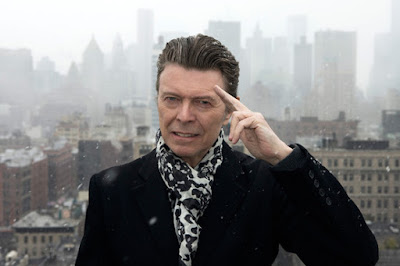Like many people, I woke up to the news. In fact, I was literally woken up by the news. My radio
alarm clock crackled into life in time for the 7.30am bulletin. I was sure I’d
misheard them. I sat bolt upright, paused for a few seconds and then reached
for my phone. I’d received a text message 40 minutes earlier from a very dear
friend. It read simply: “Bowie is dead!”
I’d heard correctly, of course.
I immediately felt compelled to write something about David
Bowie, his music and why the world was now suddenly a much poorer place without
him in it, but of course I had to go to work (real life can be both a gift and
curse sometimes), so I’ve spent much of the day trying to work out exactly what
I wanted to say. Goodbye productivity.
Here goes…
How does one sum up someone like Bowie? To refer to him as a
singer and songwriter, or even a musician, is to do him a great disservice. He
was an artist in the truest and purest sense of the word. Sure, his career hasn’t
been without its questionable choices (Tin Machine and that duet with Jagger
are obvious examples) but, ultimately, he has never made music just for the
money (although he made plenty) or to appeal to the widest possible audience
(even though his music often did) – he did it because he genuinely felt a need
to express himself creatively, often captivating and confounding in equal
measure.
Never one to rest on his laurels, Bowie has been through
almost as many incarnations and personas as The Fall get through bassists. It’s
a well-worn cliché to say this, but you genuinely never knew what he was going
to do next – and even when he returned with a completely new musical direction,
it was still unmistakeably Bowie. Crucially, it never felt false or forced; it
just felt like Bowie being Bowie.
For me, what really made Bowie stand out was that he was truly
individual in everything he did – a genuine one-off. No one else has come close
to matching the innovativeness and sheer eclecticism of his rich canon of work.
Seriously, when was the last time you heard anyone described as ‘the next Bowie’?
Come to think of it, when did you EVER hear anyone described as that? It’s really
no exaggeration to say that we will never see his like again.
Unlike many of his contemporaries, Bowie refused to fall
into the comfort zone of becoming a ‘heritage act’, instead continuing to push
forward and make music on his own terms right until the very end, as clearly
evidenced on astounding final album ‘Blackstar’. Released just two days
before his untimely death, the album now takes on a whole new poignancy when
you realise that its creator recorded it knowing he was on borrowed time (producer
Tony Visconti described it as Bowie’s ‘parting gift’, which is both heart-breaking
and heart-warming at the same time).
While many in his situation might have been tempted to give
up, Bowie instead turned in his most creative and intriguing work to date,
blending space-jazz, frenetic broken beats, post-apocalyptic funk and even
techno-tinged rhythms. ‘Blackstar’ and its equally lauded predecessor ‘The Next
Day’ (his first album in a decade) revealed a reinvigorated Bowie clearly still
bursting at the seams with ideas – it seems so cruel and unfair for him to be
taken from us at a time when he was not only producing his finest work in
decades, but most likely still had so much more to offer, if he’d only had more
time on this earth.
Like Lemmy, Bowie was someone we probably all took for
granted – we assumed he would always be here and now we’re going to have to adjust
to a world without him.
Goodbye Spaceboy and thank you for the
music. Safe journey home.
